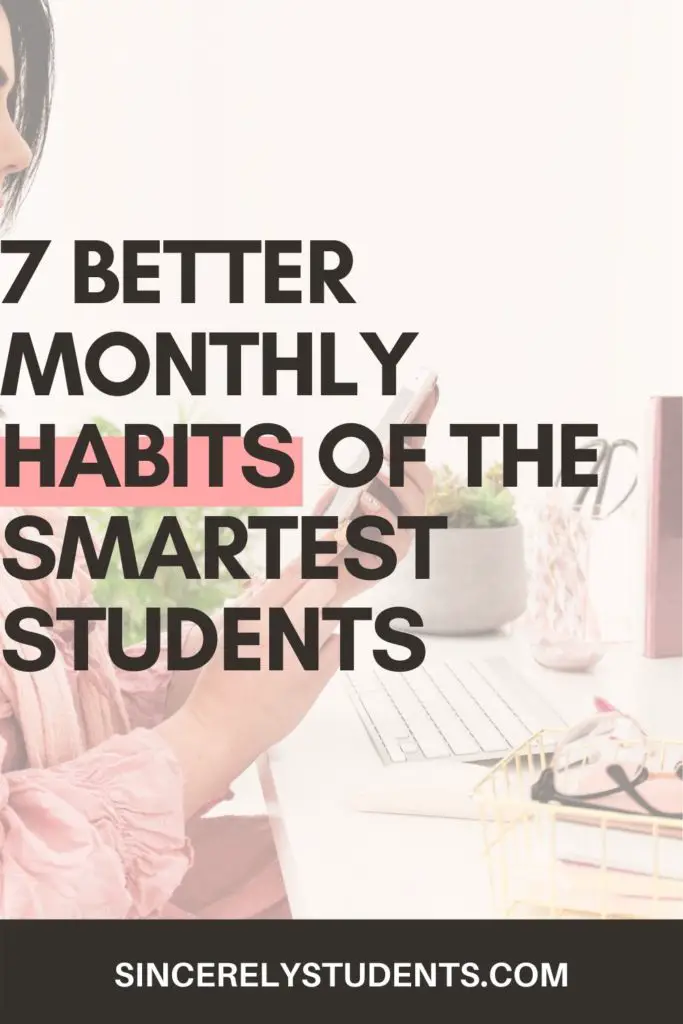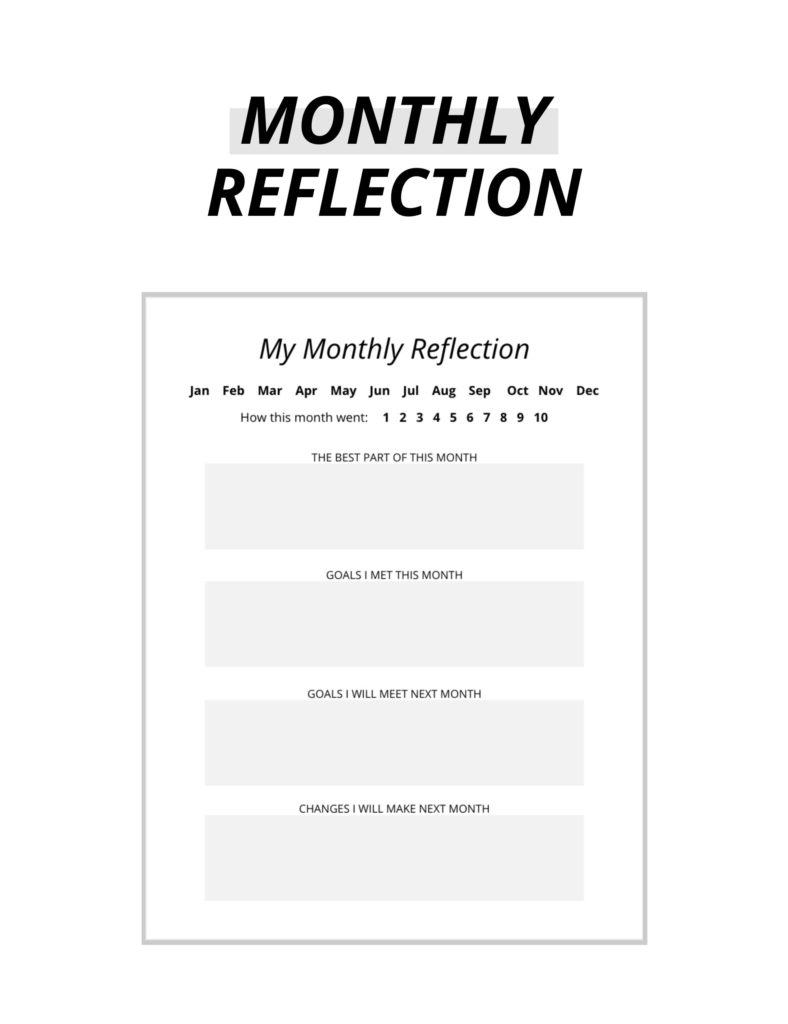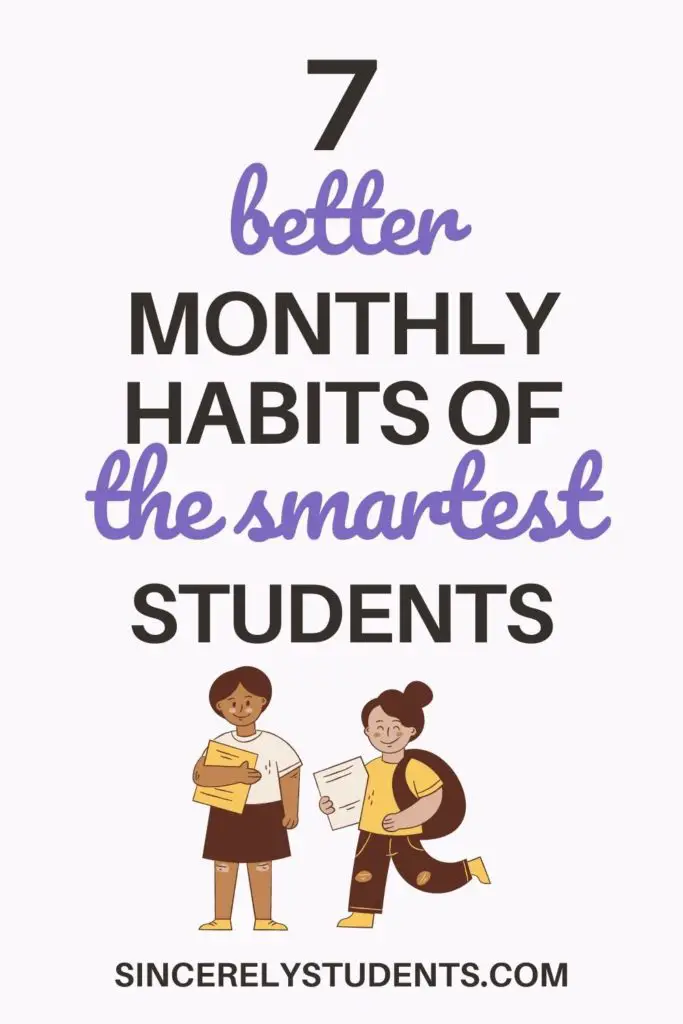No one is born a better student. Productivity and organization are– fortunately or unfortunately– not inherited traits; you simply have to build the right habits.
Building the right habits (and breaking the bad ones) is key to achieving all of your goals. If you want to learn something new, practice it routinely. If you want to achieve a goal, set up action tasks and implement those into your routine.
In this blog post, I’ll be going over the seven simple yet powerful habits that good students practice every month. That’s right, there are only seven, but these habits are essential to help you improve as a student and worker.
So if you’re ready to learn the secrets of a top-student lifestyle, let’s jump right into the post!

Plan Ahead On A Calendar
Always, always plan ahead. Planning ahead (whether it’s yearly, monthly, weekly, or daily) reduces stress, helps you stay accountable, makes scheduling events much easier, and overall makes you a more productive and effective person.
If you’re a Type A student (or simply want to be super organized), weekly and daily planning may be helpful. But in this post, I’ll simply review the steps of monthly planning.
Here are a few things you need to be doing at the start of every month:
- Have a calendar out and ready to be filled in.
- Physical planners/calendars and digital ones are both okay! Personally, I use a physical calendar as a brief overview of my month, and I use a digital calendar to go into detail for each week and day– digital calendars can be useful for reminders, color-coding, making changes in your plans, etc.
- Take note of important academic days such as exams, project due dates, study sessions, etc.
- Take note of important professional days such as meetings, interviews, paydays, etc.
- Take note of miscellaneous days like birthdays, holidays, etc.
Feel free to color-code or customize your calendar however you’d like. Make sure that it’s a system you can easily understand at a glance and that it is able to help you track your plans and be productive.
Reflect On The Past Month
Near the end of the month, allocate at least 20 minutes to sit down and reflect on the past month. Doing this routinely will help you consistently identify and break bad habits, build better ones, identify academic weakness, etc.
Use this template to organize your reflection– you can download this (and many other printables) by visiting my Freebie Library.

If you’d like to use your own journal or even just a blank piece of paper, make sure to include some of the essential questions for your monthly reflection:
- Your favorite moments from the month (the highs)
- Some moments when you felt down (the lows)
- Goals you met this month
- Goals you didn’t meet and why
- Goals you set for next month
- Changes you’ll make next month
Fill out each box thoughtfully, as these will help you map out a path of action for the following month. Each month, you should have new goals to work towards and– for repeated ones– a better idea on how to achieve them
Set Monthly Goals
Now that we’ve learned the importance of setting goals, let’s review how to set them. You may have heard of the acronym: SMART. SMART goals are the most effective way to plan out and achieve your dreams, and it only has 5 criteria:
- Specific
- Measurable
- Attainable
- Relevant
- Time-based
In order to meet all of these criteria and be truly effective, your goals should be realistic, quantitative (such as a certain amount of money, a certain test score, etc), and have a deadline. You should also be intrinsically motivated to achieve this goal, meaning that it’s relevant to your personal wishes.
If you want to further ensure that you reach your goals, implement a reward or punishment system. Promise yourself a reward if you achieve your goal by the set time, or give yourself a punishment if you don’t. Make sure to be reasonable (but strict) while setting this system!
Here are some ideas for your rewards (a reward system is often more popular than a punishment system, and I’ll leave it up to you to decide what type of punishments work best for you if you choose to use it):
- A drink or meal from your favorite store/restaurant
- Something under $20 that you want but don’t need
- A self-care day where you pause all your work
- A trip to a beach, mountain, field, etc.
YOU’LL LOVE THIS POST: 10 Powerful & Free Productivity Tools You Should Be Using
Track New Habits
Every month, try to build at least 1 new habit. This can be something small, such as reading for 10 minutes every night, or something large, such as learning and practicing a new language for an hour every day.
No matter what habit you’re building, you need to specify it, note it down in a planner or journal, and track your progress.
It’s important that you are as specific as possible when detailing your new habit. Just like setting goals, you should include a quantifier (a certain number of minutes, pages, etc).
When tracking your progress, it’s easiest to use a daily habit tracker that you can fill in. This can be a simple system in your bullet journal or an elaborate one that allows you to reflect on each day. I like the first one better, as I prefer to have a simple system to track daily activities.
Tracking habits can seem easy, but actually making them stick can be difficult. I’ve created a foolproof 8-step process you can follow to ensure successful habit-building. You can find it in this Complete Habit-Building Workbook; it includes various habit trackers and lists and is an easy shortcut to learning how to build better habits. Check it out!
Clean & Organize Your Desk
This is a habit I swear by. Every single month, I take some time (it usually takes less than 10 minutes!) to reorganize my desk and get rid of the clutter that’d built up over time.
Especially during online school, I’ve found that notebooks and papers keep building up and will clutter your desk and mind. A cluttered desk is never a good environment for consistent and productive work, so I make it a habit to clean my study space regularly.
Here is an overview of the exact steps I follow (you can visit the full post– How To Organize Your Desk To Maximize Productivity– for detailed explanations):
- Decide if you need a new desk or not. Especially if you spend hours at your desk every day, invest in a sturdy, high-quality, and ergonomic desk.
- Remove everything. Start with a blank slate and decide which items are worth keeping. This can also help you try out new arrangements for everything on your desk.
- Throw away the useless things that are just taking up space.
- Clean and set up your desk. I highly recommend using desk organizers to organize your papers, notebooks, pens, and miscellaneous items. Here’s my favorite set of pen organizers.
- Store everything else. Put everything else that’s unnecessary away. Do not keep them piled on your desk; if needed, use a rolling cart or shelf to organize these!
Have a Digital Detox
Almost every teen today is on social media, and this can be a good or bad thing. While there are benefits to being online every day, there are obvious detriments, especially with an often negative culture online.
Therefore, it’s important to have a digital detox every month (or however frequently you feel is fit). A digital detox will help you step out of the cycle of negativity and comparison that’s prevalent on social media and offer some time to just be yourself.
A digital detox sounds fancy, but all you really need to do is stop using apps like Instagram and Twitter. If you struggle a lot with staying away from these apps, delete them. If you feel that you don’t need to delete them, simply turn off your notifications.
Your digital detox should last more than a few hours. Instead, pick a few days (even 2 days can make a difference) where you won’t go on social media at all. You can let your friends know that you won’t be reachable on these apps, but do not fear that you’ll be “missing all the action” by removing yourself from social media.
A digital detox helps you reduce stress and improve sleep, which are basic ways to maintain your physical health. And your health– both physical and mental– is the most important thing to take care of, so build digital detoxing into your monthly routine!
Finish A Book
Reading is so important, yet so many students these days only read when they’re required to. This used to be me, but I realized that reading is one of the most interesting (seriously!) and effective ways to keep my mind healthy and active.
Through my own experiences, I want to conclude that reading more books really does make you more intelligent. The exposure to various styles of writing, opinions, and stories expands your bank of knowledge, which– in my opinion– truly “makes you smarter.”
I can promise you that there are countless interesting books out there you will love. I’m a big fan of fictional literature, and I’ve come across so many great books from genres like fantasy, historical fiction, realistic fiction, science fiction… you don’t need to read nonfiction to gain knowledge!
At the start of every month, pick one book you’re interested in. Read the title, the blurb, some reviews, and the first line of the first chapter. If it intrigues you, start reading it. You have a month to finish it; this should be ample time!
You can find book lists online (check out Goodreads), and I often turn to YouTube for recommendations on interesting and underrated books.
Your local library is a gem, so visit it often and start reading!
Conclusion
Building the right habits can change your life. Though this list is short, these are some of the most important habits you must start building! If you found it helpful, leave a comment with which one you’re going to start next month!
And if you enjoyed this post and would like to learn more about becoming a better student, check out these recent posts:
- 10 Powerful & Free Productivity Tools You Should Be Using
- 20 Actionable Steps To Become An Outstanding Student
